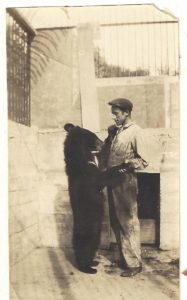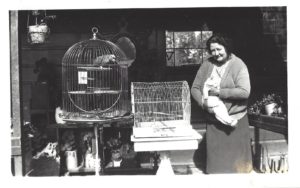
Animals were a feature of life at Holy City. There was the zoo, of course, which over the years held a variety of creatures. One photograph in Irvin B. Fisher’s personal collection advertises an eagle in captivity, and another shows him playing with a small bear named Dixie (left). He would awe the children by putting his head in the bear’s mouth. Sadly, Dixie was poisoned by persons unknown. Other creatures included a deer, a parrot, and as Sarah Weston reported in “The Holy City of Father Riker” in The Mid-County Post in 2005, “The zoo, which claimed to be ‘The World’s Most Exotic Collection of Animals,’ contained mostly cats and dogs, one spray-painted bobcat, and a donated monkey who was too ill-tempered to be kept by its owner.” There are some reports that the monkey once bit a child, provoking threats of a lawsuit.
Lucille Riker was so fond of animals that her poem, “House of Worship,” published in April 1941, pleads for their good treatment at the hands of humans:
Should we not excel the animal
In devotion, intellect and love?
These natural principles are what we need
To apply and prove we are above
The animal in every way.
He is willing to give us a break
By worshipping us, placing faith in us
Though he knows if we are real or fake.
The animal is at our mercy
Let us not disappoint him, I pray.
Let us be humane in our dealings with him,
In the end it is going to pay. (1)

A very early photograph taken when Holy City was just being built circa 1919 shows a dog jumping up on a well-dressed Lucille just as the shutter snapped. Fifteen-year-old Margaret Stauss, one of the few children ever to live at Holy City, looked after the domestic animals. Winifred Allington, Riker’s secretary, transcriptionist, and a close friend to Lucille, was well known in the neighborhood for giving a home to any cat that needed one, sometimes feeding and housing dozens at a time. In later years, “Allie’s” personal journal becomes a record less of the goings-on at Holy City than of the arrivals and passing of a succession of cats. In May 1963 she told reporter Betty Barnacle, “I’ve had up to 30 or 40 cats at a time.” (2)
Lucille liked cats as well, and she and her husband had a dog, rather unimaginatively named Boy. Boy achieved a measure of fame when in 1945 Lucille published a song entitled, “Please Don’t Leave Me Daddy.” The cover on the sheet music says “Words and Music by Lucille Riker,” but at that time, it was possible to send lyrics to a company such as Broadcast Music, Inc., in New York and have a contract composer set the lyrics to a tune. I suspect that this is the case with this piece, her only published song:
Please don’t go and leave me, Daddy,
I’m so lonely without you;
I can’t live without you Daddy,
Little Boy’s love is true blue.
CHORUS
Come and take Boy with you Daddy,
In the car Red, White and Blue;
Let me sit on your knee Daddy
And I’ll honk the horn for you.
I’m your little Boy-dog, Daddy,
Can’t you hear my silent voice?
I know you won’t leave me Daddy,
Little Boy’s great pride and choice. (3)
Several accounts tell of Riker driving in to Los Gatos in his red, white, and blue Cadillac with the dog in the car. Since his leg had been broken in one of his many car accidents, he found it difficult to get out of the vehicle, so he would park outside the bank or other establishment and honk the horn until someone came out to assist him.
Sources:
(1) I.B. Fisher Collection, Folder 1941, collection of the author.
(2) The Harry Plate Collection: The Rikers and Holy City 1900–1970, Box 1, Folder 22 (2007-30-113), History San Jose Research Library.
(3) I.B. Fisher Collection, Folder 1945, collection of the author.